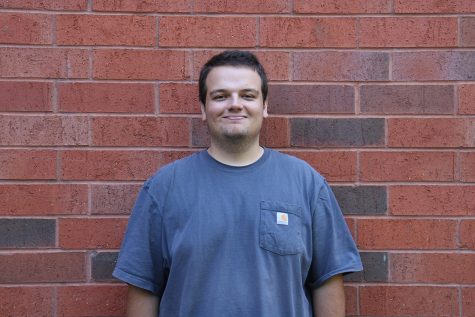Tunes with Thomas: Wu-Tang takeover
Sam comes out of the shadows to steal a column… now, Songs with Sam
Photo by Bethany Mennecke
From the slums of Shaolin, the Wu-Tang Clan strikes again (insert kung fu movie sounds).
I, too, strike again, occupying “Tunes with Thomas” to talk about my favorite boyband, the Wu-Tang Clan, in this week’s “Songs with Sam.”
For those of you who don’t know about the RZA, the GZA, ODB, Inspectah Deck, Raekwon the Chef, U-God, Ghost Face Killah, Masta Killah and the Method Man, you’ve been missing out.
The Wu is a hard-hitting, bar-spitting, hash-slinging group of rappers from Staten Island — or Shaolin, as they call it — who changed the music industry in the 1990s.
Much of what I have to say about the Wu-Tang Clan was beautifully covered in Hulu’s “Wu-Tang: An American Saga,” so if reading makes you sleepy, feel free to watch that instead. Or read this, feel FOMO from a Wu-free life and check it out after.
In 1993, after months of rumblings in the streets of New York, an album appeared, unlike anything anyone had heard.
The foundation of “Enter the Wu-Tang (36 Chambers)” was classic New York hip hop; Hammering boom-bap drums, looping jazz, funk and soul samples, and energetic, gritty bars.
The group took this foundation and used it as the blueprint for what I consider one of the most unique, hungry and creative rap albums of all time.
Track after track — from the slamming, epic opening track “Bring Da Ruckus,” to the melancholy and haunting “Tearz” — tell tales of Staten life and individualism.
Using kung fu movies, superhero comics and Black nationalism, the Wu found a way to take stories older than rap itself, and mystify them.
“Killa Hill” and “Stapleton,” Staten’s two rival housing projects, became “Wu-Tang” and “Shaolin,” two different training grounds in which the members honed their “sword styles” (rap skills).
Street life, and the craftiness required to succeed in it, became “chessboxin’.”
The struggle for money became “C.R.E.A.M,” an acronym meaning “cash rules everything around me.”
Another thing that set the group apart, was that there was no frontman, according to group member Clifford Smith Jr., better known as Method Man.
“RZA is the de facto leader, but we’re all generals,” he said.
This shows in their music. Every song sounds like the whole group is in the studio, cheering each other on as they deliver hard-hitting and poetic verses.
It has an aura of healthy competition and supportive friendship, which blankets a layer of wholesomeness on top of all the music.
Bobby Diggs, better known as the RZA, formed the group, directed its vision and produced the beats. But he didn’t stand above the crew, he stood beside them. Where he went, they all went. So, when RZA aimed his sights at the top, his friends were right there with him.
Because of RZA’s vision, the group went on to create hundreds of collaborative and solo projects, cementing the members’ legacies and influence.
Tons of contemporary artists from Denzel Curry and Griselda to Drake and Kanye West cite Wu-Tang as a huge influence.
Naming all of the Wu’s essential projects would take too long, so instead, I’ll offer a starting pack.
“36 Chambers” is where it all began. No Wu fan’s journey should be any different.
After that, “Liquid Swords” by GZA. He’s one of the less animated group members, but once he was given room to breathe, it quickly became obvious why the group calls him “genius.”
Then comes time for ODB. His first two solo albums are unique, dynamic and incredible. His energy and individualism are a large part of what makes the Wu so exciting. Who would’ve thought yodeling and rapping would go well together?
From there, “Wu-Tang Forever” is a good place to be. I prefer “36 Chambers” over the group’s second album, but Inspectah Deck spits one of the best verses I’ve ever heard on “Triumph.”
While ODB might’ve said “Wu-Tang is for the children,” adults can enjoy it, too.
Johnson can be reached at johnsosg4574@uwec.edu.

Sam Johnson is a fifth-year creative writing and journalism student and this is his fourth semester on staff. When he's not panicking in The Spectator office about becoming a real adult soon, he's panicking in other places, usually his dorm or Dooley's, about becoming a real adult soon.


